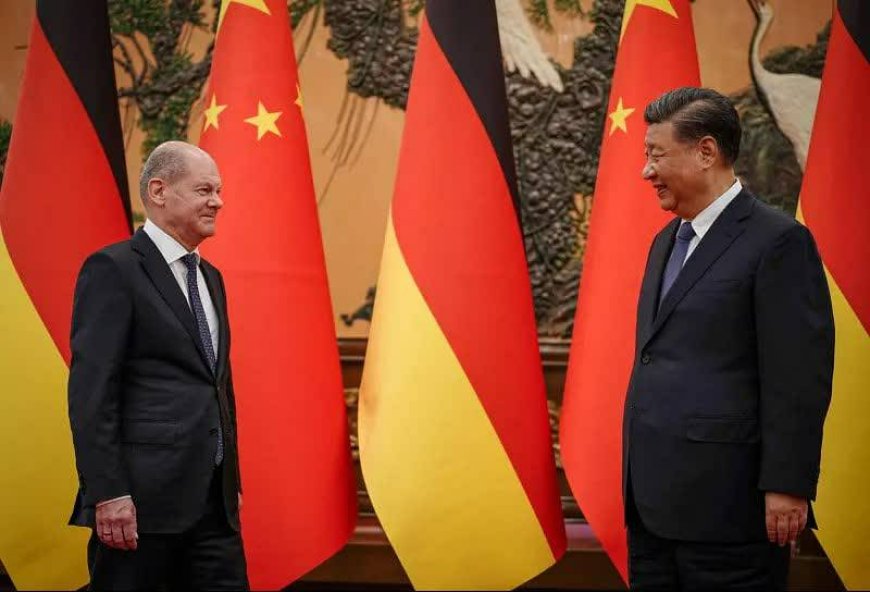Germany's New Strategy on China: Navigating Economic and Security Challenges
Germany's New Strategy on China: Navigating Economic and Security Challenges

Germany's recently published strategy on China signifies a formal recognition of the evolving relations between the two countries and the European Union (EU). This article seeks to explore Germany's efforts to address its dependence on China while maintaining economic and diplomatic ties. The new strategy's delayed release, internal disputes, and the delicate nature of Germany's ruling coalition further complicate Berlin’s approach to China. This article also examines Germany's economic ties with China, concerns over raw material dependence, and the government's plans to diversify import arenas and enhance domestic manufacturing capabilities.
Shifting dependency and balancing ties:
Germany's Foreign Minister, Annalena Baerbock, emphasised the need to reduce dependence on China for key technologies such as semiconductors, artificial intelligence, and green technologies. In the same political vein, Chancellor Olaf Scholz clarified that Germany does not seek to decrease ties with China but aims to avoid critical dependencies. The differing perspectives within Germany's ruling coalition, comprising the Green Party, the Social Democrats, and the Free Democratic Party, indicate a lack of a unified foreign policy approach.
Economic ties and investments:
Germany maintains strong economic ties with China, which is its largest trading partner. While Germany exports more to the United States, major German companies, including Volkswagen, BASF, and Siemens, continue to increase investments in China. The controversial approval of the deal allowing the Chinese company COSCO to buy a stake in the Port of Hamburg highlights divisions within the German government and concerns raised by opposition parties and the European Commission.
Raw material dependence:
Germany acknowledges its reliance on China for critical raw materials, particularly various metals and rare earths essential for chip manufacturing. The EU's dependence on China for rare earth minerals, accounting for approximately 94% of its supply, has been reinforced by China's recent export embargo on gallium and germanium. In response, Germany plans to diversify its import arena for raw materials and bring key technology manufacturing back home.
Germany's new approach and human rights concerns
The release of this strategy marks a significant shift in Germany's stance towards China, aligning it with the European Commission's critical view of China. The strategy emphasises the importance of Taiwan as a trading partner and signals Germany's intention to pressure China in the Taiwan Strait and beyond. While Germany does not seek confrontation with China, the strategy aims to diversify Germany's partners to safeguard its security and bargaining power in the international system. Human rights concerns are also prominently addressed in the document.
Climate change and economic cooperation
The strategy acknowledges the limited scope for cooperation with China on climate change given the increasing competition over clean energy technology supply chains. Economic security considerations, aligned with the European Commission's strategy, take precedence in the document. The rejection of the EU-China Comprehensive Agreement on Investment (CAI) indicates a new geo-economic mindset in Berlin, aligning with the expectations of Washington and Brussels.
Transatlantic and EU coordination:
Germany's strategy commits to developing policies that strengthen, rather than weaken, the EU's approach to China. Bilateral discussions, such as intergovernmental consultations, serve as venues to advance the EU's agenda. The importance of transatlantic coordination is emphasised, particularly in light of strained economic relations between Germany and the United States.
Germany's new strategy on China reflects a recognition of the evolving dynamics in economic and security relations. As Germany seeks to reduce its dependence on China, diversify its partners, and enhance domestic manufacturing capabilities, it faces internal disputes and challenges within its ruling coalition. The strategy aligns Germany with the European Commission's critical stance towards China and signals the emergence of a new geo-economic mindset in Berlin. Transatlantic coordination and cooperation remain crucial in navigating the complexities of Germany's approach to China and safeguarding its economic and security interests.













































